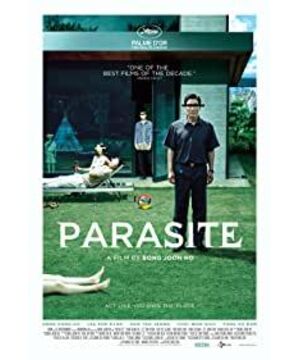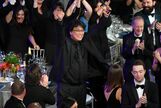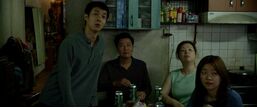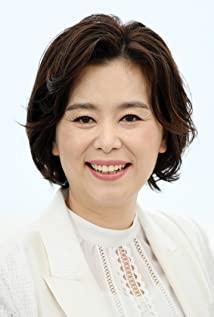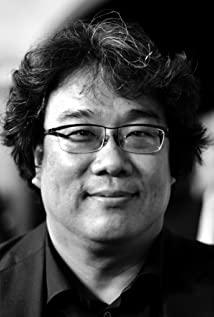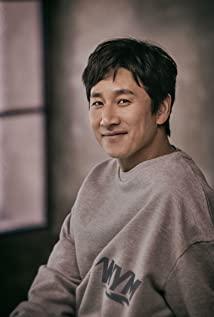In the construction of audiovisual language and text symbols, I can give "Parasite" full marks, but there are many things that make me quite criticized in the layout of the play. On the whole, Feng Junhao's new works give the impression of being separated, but they are not completely cut in half, but involve each other. For example, although there are many faults in the drama, many plot points are either hurriedly brought or are clichéd and lack the logic of the drama, but on the other hand, the structure and rhythm of the drama are so impeccable. The camera movement and editing of the film are all top-notch, but there is no suggestive imagery, and all the connotations are basically expressed openly and straightforwardly.
This film once again proves that Feng Junhao is the undoubted master of contemporary genre films. But at the same time, through the example of "Parasite", we can fully experience the global dilemma faced by genre movies. When the experience of entertainment is exhausted, when the paradigm of the text is constantly imitated, and the inherent creative policy can no longer satisfy the genre expression, how can the directors and writers who work in this field reposition their own form and content?
Nowadays, the entertainment appeal of genre films is basically monopolized by "high concept", and superheroes are the most representative example. This has wiped out the medium-cost film market. It is a common phenomenon now that apart from independent, low-cost genres and hundreds of millions of super-productions, it is difficult to see medium-scale qualified genre films in theaters. The fledgling young directors will either step up to the sky and directly participate in the super giants of Disney and Warner, or continue to wait for the opportunity at the bottom to shoot some cute and cheap low-cost, hoping to one day be favored by the entertainment empire. This indirectly led to the intensified Matthew effect of popular culture. Interestingly speaking, these phenomena are in line with the problems revealed by "Parasites".
It is undeniable that "Parasite" is a good-looking movie, and its viewing ability should be the strongest among all genres this year, but is it a good movie? I cannot draw a conclusion immediately. What hinders my judgment is not because the allegorical narrative of the film contradicts the logic of reality, but because of its lack of ambiguity. "Parasite" is a movie with a clear point, just like most types of movies. But Bong Joon-ho's previous "Memories of Murder", "Mother", "Han River Monster" and even "The Kidnapping of the Doorway Dog" all have distinct and ambiguous ideographic features. The lack of ambiguity will definitely lead to insufficient aftertaste in the work. Introspection and warnings have all been called out through the film, so what is left for the audience to interpret and discuss are all things outside the film. As a result, the work itself became the topic, and after reviewing the topic (watching the movie), the audience enthusiastically began to compose the proposition.
I'm not taking Ozu's "movie with the aftertaste to determine whether you win or lose" as a standard. Ozu's sentence is just a metaphor, just like many people compare the subjective feelings of art to food, which expresses some kind of inconsistent meaning. In particular, comparing movies to food is already the rhetoric of bad streets. Both in terms of language beauty and novelty, it is annoying, but it is indeed more precise and appropriate. In any case, the remaining threads of the movie are there after all. Art films like Ozu give the audience an emotional aftertaste, while genre works like Bong Joon-ho use drama to resonate with the audience. But the latter is more difficult to achieve the lasting, even if it is an open ending, it is just a kind of suspense pleasure, and it is impossible to further improve the ideographic system through the audience's mind.
In the same way, I am not disgusted with this kind of "throwing bricks to attract jade" movies, but this kind of completely thorough movie is sometimes so good that I have nothing to say. If only a formal analysis is carried out, it will inevitably destroy its smooth and compact structure, appear pale and lose sight of the other. If expressing opinions on the subject, with clear directivity and straightforward metaphor, everyone is just saying the same words. For "Parasite", my criticism of it is not enough to make me deny its excellence, so I stand on the opposite side of most people and criticize why it does not deserve the honor of Palme d'Or. However, even from a positive standpoint, its outstanding features are almost exhausted. Because the symbols and metaphors in the film have become very clear in Feng Junhao's constant emphasis, and no more intermediary interpretation is needed.
Many symbolic audio-visual techniques are as clear as the subject of the film. For example, the downward movement of the camera at the beginning and the end is to highlight the underlying depression with action. The names of Keeze and Chung-suk are double "parasitic". The prop-good luck stone, from when Min Hyuk sent it, to when it floated on the water on a rainy night, to when it was used as a murder weapon, to when it sank to the bottom of the water, although its meaning was constantly changing, its symbolism was always quite clear. The rainstorm night is the watershed between the two parts of the film and the peak of the narrative rhythm. The curve of the whole movie is a towering mountain, the biggest climax is in the middle section, and the front and back slopes are sometimes steep and sometimes gentle. On a rainy night, President Park’s family returned. The scenes, actions, lighting, and the scheduling and editing of the shots were the most exciting part of the film, and they really made people look like cockroaches.
The second half of the film only develops logically, the tragedy has always been throughout, so there is no so-called reversal. The chaotic and bloody birthday party is the inevitable result of long-term parasitism from the bottom to the top. Two plot points that violently strike the audience's heart in the film, the announcement of an underground secret room, and a vendetta at a party are just tools to accelerate the narrative, and do not assume any function of reversing the plot. The ending cannot be regarded as an open ending in the strict sense, at best it can be regarded as semi-open, because the individual fate of the characters concerned in the play has been temporarily settled, and there are no other unresolved issues. (What about Song Kanghao's underground life, whether his son can make money to rescue his father, what about President Park's widow and children, these do not constitute part of the film itself) The narrative structure of the film is completely closed.
In response to the reality and logic problems criticized by many people, my view is that from the very beginning of the birth to the present, one of the most essential core functions of images is to reach greater truths through lies. Images can never reflect reality truthfully, nor can it be our responsibility to reflect reality. Realism is just a style, and it cannot be equated with reality. However, images continue to reproduce reality and create reality. There is an essential difference between authenticity and reality. The two are sometimes related, sometimes completely unrelated. In "Parasite", the allegorical style of the movie is revealed after the Ki Ze family enters President Park's family in an all-round way. Fables do not even pay attention to the so-called logic of reality. Once the fables are formed, the pattern is fixed, the content and the situation are emptied, and the characters and plots are all turned into metaphors in order to explore some profound phenomena and philosophies. The tragic, ironic, and precautionary features are ready to come out.
This is why, in the second half of the film, the narrative space is almost built around the mansion. President Park’s house became a miniature model of class society after the rainy night. The air-raid shelters and the iron doors of the basement become barriers between the upper and lower floors. The image of the stairs is also perfected here, becoming the actual body that promotes the narrative in the image, not just a symbol of passing by. Thus, the Indians, Morse code, water, huge French windows and other metaphors are unified through the allegorical space. However, these do not need to be excavated, the film has all the information clearly shown. Including the theme of the text, the whole process revolves around class antagonism, which exudes some of the evil of the weak, high-level hypocrisy, and a culture of resentment, and it is impossible to distract the closeness of the intention.
Of all the metaphors, smell is the most original setting of this movie. In this film, the invisible and intangible smell becomes the essential "original sin" of the lower-class population against the upper-class society. President Park’s words on rainy nights revealed the essence of scent as identity, wealth, and status. At first, the younger son, Dosong, smelled the same smell on them, and President Park also disliked the smell of Kizawa that resembled boiled rags, just like people on the subway had the smell of subway crowds, and people living in the basement had the smell of the basement. Although lower-class people and upper-class people can restrain their words, deeds and expressions from crossing the boundary, the smell will eventually cross the boundary easily. To some extent, the upper-class smell became the McGovern of "Parasite". It does not exist in the image, but it is the goal of the Keizer family. Therefore, Ji Ting's phrase "The poor sourness of the basement, you will never get rid of it unless you move out." is the finishing touch to the whole film.
In addition to smell, the stairs are another very important symbol. Several wide-angle lenses show the process of characters going up and down the stairs, which is to visually reveal the social dilemma caused by the solidification of the class. At the climax of the film, Kize and his children eavesdrop on the conversation in the air-raid shelter, but they slipped and exposed everything. Linked to a series of events before and after, from taking advantage of the president’s family to go out, eating and drinking in the living room, to a sudden thunderstorm, to the sudden visit of the former housekeeper, the secret of the basement, the reversal of host and guest confrontation, until the president Home suddenly returned. Dramatic conflicts are not only caused by a series of accidents, but also seem to show the instability and danger that the lower class will inevitably cause after breaking through the class through improper channels.
Feng Junhao's brilliance lies in showing class as an objective form, and then discussing the alienation of people by class, the division of groups, and the devouring of human society. Therefore, the president's family has no edges and no arcs. If you get it in other movies, it is undoubtedly a failure to write such a character. But in "Parasite", the president's wife with a simple mind, the president's daughter who fell in love with the English teacher involuntarily, the youngest son with psychological problems, and the president himself, become The reflection of the upper class. This is a rare technique in genre films. It is willing to abandon emotional motives, eliminate the individual differences of the characters, and highlight their group representativeness.
In addition, Bong Joon-ho did not leave any room for "class", and President Park's family is not a facial image of a landlord/capitalist. They have not done any evil. Although they despise the people and are hypocritical, they have no obvious reason to force the Keize family to attack them. This is a deliberate design by Feng Junhao. It does not give the audience any excuses on emotions, morals and values. Instead, the upper class is flattened and treated as ordinary people without any taint, while the lower class is scheming and instinctively coveted. The living space of the other party.
Bong Junhao didn't set up a clear opposition between good and evil, and even if it did, it would be dislocated and vague. In this way, "class" as a part of the objectively existing power structure is itself sinful. Even if the "superior people" are not ferocious in appearance, and they have not significantly suppressed anyone who is persecuted, even the "inferior people" are not honest and hardworking working people. But as long as there are classes, it will inevitably be accompanied by oppression, exploitation, discrimination and violence. What Feng Junhao wants to express is the panoramic contradiction of class society. Therefore, Zhongshu's "They are kind because they have money. If I have so much money, I can also be kind." It sounds very embarrassing.
This year there is also a movie about class antagonism, Jordan Peel’s new thriller "We". Examine it together with "Parasites" and make a judgment. The starting point of "We" is also very sharp, mixed with issues of identity politics, and the structure is much larger than that of Bong Junhao. But at the end of "We", the individual's emotional motivation was created through reversal, which instantly dispelled the film's theme from the invisible, and at the same time caused the ideographic system to quickly collapse. This film is a model of superfluous superfluous, otherwise, without the clever ending, it can be broken with "Parasite".
"We" also has an allegorical nature, and also does not follow the logic of reality, so this is not the fundamental reason why it has been criticized. However, in order to create a false reality (with the purpose of achieving greater truth), images do not have to succumb to the logic of reality, but must follow the logic of drama or art. I have mentioned the need for "continuous facts" in genre movies. The story does not have to be established in reality-after all, the movie is not a social experiment-but the story must conform to the "coherent fact", that is, to eliminate any possibility of confusion for the audience, thereby creating a complete chain of cause and effect and action The smoothness of the chain and the rationality of the dramatic conflict in the context.
The bad thing about "We" is that its narrative didn't realize the importance of "coherent facts" from the beginning. Judging from the performance at the end, two-thirds of the film's length is completely narrated by intuition, and it is a miracle to be able to fail to collapse early. "Parasite" also violates the "continuity of facts". From the superficial perception, it is more like Feng Junhao has noticed this, but is indifferent to it, and is unwilling to spend extra energy to show the actions behind the incident. However, from the perspective of the effect of the finished product, this indeed hurts the "continuity of facts."
The rupture of the chain of cause and effect and the chain of action was concentrated in the previous hour, that is, the process of the Kize family parasitic to the president's house. The entire process of dismissing the driver and the former housekeeper is presented in a montage style. It is fast and messy, very smooth, and it seems a bit hasty in rhythm. The logic of the play can only be perfected through the continuation of the plot. However, Feng Junhao clearly knew that the audience would realize what happened next and chose to "fast forward" this process, but it was bound to produce ambiguity in the text. President Park and his wife could directly ask the client about underwear and tuberculosis. Even if the attitude was very bad, even if the president's family did not believe in the arguments of the driver and the housekeeper, at least they constituted a part of the logical construction.
Perhaps what Bong Joon-ho wants to imply is that the president's family has never faced these servants (except perhaps the eldest daughter), and has never really looked into and cared about the servants, so that he appears so innocent and stupid, and easily falls into Kizak. Home scam. But we can't just rely on our brains to perfect the transitional plot that the movie should have explained. The hasty presentation of the parasitic process of the Kize family is almost the only flaw in the script of "Parasite". Due to the dramatic conflicts and the themes of the film, the audience ignores these flaws intentionally or unintentionally.
It is quite interesting that the Keizak family once appeared in Bong Joon-ho's film, "Han River Monster". Like that movie, the members of the low-level family in "Parasite" are also a group of frustrated or outdated people who have succeeded or possessed skills that could have succeeded. Zhong Shu is a former track and field player, Ji Ting has excellent graphic design and art talent. Ji Woo is a "professional candidate" who is well versed in exam-taking skills, has a quick brain response and a good appearance. Only his father, Keeze, is slightly mediocre, but he can be qualified for the driver position of President Park when he comes up. At least his car skills are very good.
Feng Junhao is willing to focus on small people, and always gives small people something beyond ordinary people, either by willpower, or forbearance, or mastering a certain eye-catching skill. In the process of fighting against one's own destiny or the external world, these supernormal places will more or less exert some effects, but they may not play a key role. In the process of "Dove occupying the magpie's nest" in the Kize family, Feng Junhao sacrificed the motivation of driving the plot and the integrity of the causal chain in order to bring through the same paragraph My own conditions, it's just that these are thinner on the foreshadowing.
"Parasite" was inspired by the last carriage of "Snow Country Train". Therefore, the secret refuge room, the dark color and light, formed a huge difference from the mansion. This is completely two images of texture, as if two disconnected worlds were forcibly merged together. Just like the strong contrast formed by the different carriages in "Snow Country Train", it gives people a noticeable sense of tearing visually. This is where Feng Junhao is good. "Parasite" creates a spectacle of a class allegory. Through the director's step-by-step induction, the two groups finally end in suffocating violence. The genre films are gradually approaching the theme through constant setting. If treated with a naturalistic perspective, it will be difficult to accept. I do not reject well-arranged narrative images, which are self-consistent and smooth. However, this film is a type of work that is rare in recent years and has no flaws in the audiovisual, but the sculpting of the text is still a bit lazy.
As a sociological director, Feng Junhao once again used "Parasite" to direct criticism at society itself. Bourdieu's research on class habits, class taste and class domination is pervasive in every detail of the film. The guests at the birthday party, even if they did not give them enough shots to show them, at a glance, they can see a high degree of similarity with the president's family in behavior. "The objective consistency of collective or class habits stems from the consistency of living conditions." Most of Feng Junhao's works vividly reproduce Bourdieu's extrinsic exposition of class.
In retrospect, President Park's house, or all upper-class society, will inevitably provide the bottom class with a steady stream of parasitic opportunities, because they need the bottom labor to serve. Even if the upper class is really kind, selfless, and restrains their sense of superiority, they cannot prevent the production of productivity/economic exploitation and symbolic violence. This is due to the objective nature of class. And the lack of consciousness of subject independence common to the bottom population is also truthfully reflected in the Keize family. Their pursuit of wealth and power has led to the emergence of a new belief. The personified deity of wealth and power such as President Park is not only the object of their admiration, but also the target they hope to replace.
The ending of "Parasite" is quite magical. Keize took the place of the former housekeeper's husband, hiding in the underground refuge room, doing the same job as the previous resident: using Morse code to send a signal. No matter who the owner of the mansion is, as long as he comes from the upper class society, he will treat the strange sensor light in the living room like a cockroach at home, showing an indifferent and indifferent attitude.
View more about Parasite reviews


